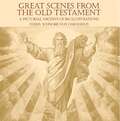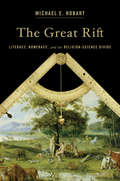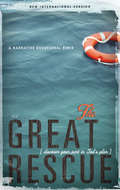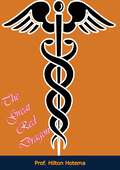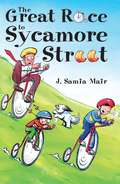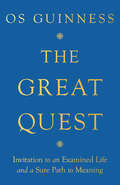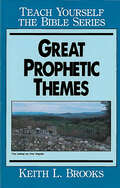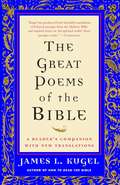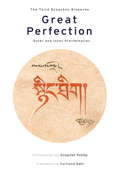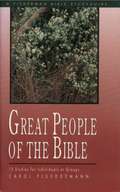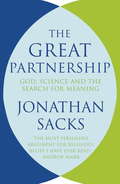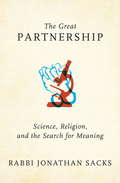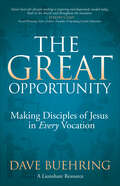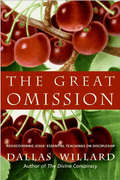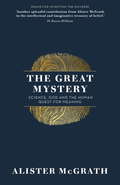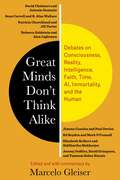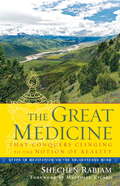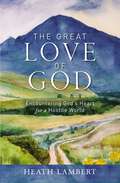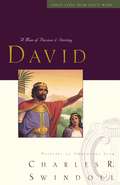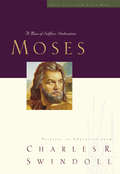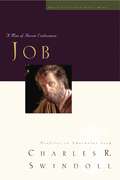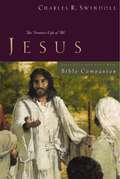- Table View
- List View
Great Scenes from the Old Testament: A Pictorial Archive of 160 Illustrations (Dover Pictorial Archive)
by Julius Schnorr von CarolsfeldOne of the most inspired painters of the nineteenth century, Julius Schnorr von Carolsfeld (1794 -1872) was also a brilliant engraver and draftsman. This collection, among his major accomplishments, includes scores of engravings that bring to life familiar scenes from the Old Testament - from the creation of the world and the fall of Adam and Eve to the story of Noah and his Ark and David's slaying of Goliath. Imbued with a sense of grace and spontaneity, Schnorr von Carolsfeld's monumental compositions pay minute attention to detail. Each of the 160 beautifully composed images, selected from a rare nineteenth-century publication, is accompanied by a caption citing title and biblical book and chapter.An important reference for students and scholars of scriptural studies, this handsome archive will also serve as an important sourcebook for designers and commercial artists.
The Great Rift: Literacy, Numeracy, and the Religion-Science Divide
by Michael E. HobartIn their search for truth, contemporary religious believers and modern scientific investigators hold many values in common. But in their approaches, they express two fundamentally different conceptions of how to understand and represent the world. Michael E. Hobart looks for the origin of this difference in the work of Renaissance thinkers who invented a revolutionary mathematical system—relational numeracy. By creating meaning through numbers and abstract symbols rather than words, relational numeracy allowed inquisitive minds to vault beyond the constraints of language and explore the natural world with a fresh interpretive vision. The Great Rift is the first book to examine the religion-science divide through the history of information technology. Hobart follows numeracy as it emerged from the practical counting systems of merchants, the abstract notations of musicians, the linear perspective of artists, and the calendars and clocks of astronomers. As the technology of the alphabet and of mere counting gave way to abstract symbols, the earlier “thing-mathematics” metamorphosed into the relational mathematics of modern scientific investigation. Using these new information symbols, Galileo and his contemporaries mathematized motion and matter, separating the demonstrations of science from the linguistic logic of religious narration. Hobart locates the great rift between science and religion not in ideological disagreement but in advances in mathematics and symbolic representation that opened new windows onto nature. In so doing, he connects the cognitive breakthroughs of the past with intellectual debates ongoing in the twenty-first century.
The Great Rescue (NIV): Revised Edition
by ZondervanBe drawn into the epic adventure of experiencing God’s plan. This isn’t your typical sex, alcohol, drugs, and obey-your-parents devotional Bible. Instead, it takes an honest look at the messiness of living in a broken world and walking with God through it. Daily readings and book introductions for every book of the Bible paint a picture of the reality that the Bible teaches—that there is more going on in the world than meets the eye. As you explore what it means to have God himself living inside of you, you will learn how to hear his voice, follow his lead, and recognize him in the good, true, and beautiful in the world. The Great Rescue focuses on intimacy with God and a relationship with him in every area of life. The Bible tells us that God had a plan from the beginning of time, and that we were created for a purpose: to fulfill a unique role in his kingdom. It also tells us that there is a very real conflict going on in our broken world between God and his archenemy. God wants us to be a part of his grand story. He wants us to walk so closely with him that we begin to understand his way of life and to participate in the narrative that is God’s story. It's much more than a new way to act. It’s a new way to see. Devotionals from YW Magazine, an eight-time winner of EPA editorial awards of excellence.
The Great Red Dragon
by Hilton HotemaIn the Great Red Dragon Hotema explains how all ancient religions were based on Grand Cosmic Unity. That bibles were put together along hundreds of years originally to please Constantine and compiled from what was culled from Ptolemy's vast literary scrolls and manuscripts. For instance the Twelve Signs of the Zodiac became the Twelve Apostles, and many other alterations. In addition within the pages of this book Hotema expounds upon masturbation and warns against excessive copulation which can negatively accelerates the aging illusion of the physical system. The greater the pleasure experienced thru the physical, the greater damage suffered by the mental.Hilton Hotema is the author of numerous books on dietetics, fasting, fruitarianism, breatharianism, vitality, cellular regeneration, longevity, higher consciousness, spirituality, alternative medicine and ancient wisdom.
The Great Race to Sycamore Street
by J. Samia MairThis topsy turvy adventure on Sycamore Street sees brother and sister Hude and Amani arrive in the country with one thought: it was going to be a long, boring summer.They couldn't be more wrong.With Grandma Hana's new neighbour planning to pull down her prized peach tree and a gang, led by the archer Bobby, marshalling the local lake, Hude and Amani have a hard time getting any peace.In this warm and comical story, find out how, under the watchful eyes of Grandma Hana, Hude and Amani plan to save the peach tree and beat Bobby at his own game before leaving Sycamore Street behind.J. Samia Mair has published two children's books with The Islamic Foundation, Amira's Totally Chocolate World and The Perfect Gift, which have been favourably received. She is currently a staff writer for SISTERS Magazine. Additionally, she has published articles, stories, and poems in books, magazines, anthologies, scientific journals, online news sources, and elsewhere. This is her first chapter book for kids. She lives in Odenton, Maryland.
The Great Quest: Invitation to an Examined Life and a Sure Path to Meaning
by Os Guinness"The unexamined life is not worth living." —Socrates
Great Prophetic Themes (Teach Yourself the Bible)
by Keith BrooksThe Teach Yourself the Bible Series is one of the best New Testament studies you will find anywhere. Each book in the series is packed full of valuable questions on individual chapters of the Bible, check-ups to test your grasp of scriptural truths, and usable suggestions for group study.Grow in your knowledge of God through each New Testament book, then go on to study six aspects of Christianity essential for all believers: doctrine, prayer, eternal life, prophecy, Christian character, and Bible study.The Lord's coming is mentioned 318 times in the 260 chapters of the New Testament, and numerous times in the Old Testament. It is a truth of much importance. Study the great prophetic themes that run throughout the Bible with this valuable book.Strengthen your relationship with the living God with all twenty-five books of the Teach Yourself the Bible Series. Each volume is a timeless, yet practical, study of the Word of God.
The Great Poems of the Bible: A Reader's Companion with New Translations
by James L. KugelFrom the Psalms to the Prophets, from job to Ecclesiastes, much of the Bible is written in poetry. The poems of the Bible include some of its best known and most beloved passages: "The Lord is my shepherd," "Let justice roll down like waters," "By the rivers of Babylon," "Remember your Creator," "Arise, shine, for thy light is come!" These poems live in the hearts of those who are familiar with the Bible and offer rich rewards to anyone who is approaching the world's greatest book for the first time.In The Great Poems of the Bible, Harvard scholar James Kugel presents original translations of the most beautiful and important poems of the Scripture. Taken together, these poems represent the very essence of the Hebrew Bible. Reading them one after another is like taking a guided tour through Scripture, meeting firsthand some of its most important teachings and opening the way to an understanding of the Bible as a whole.Each poem is accompanied by an eloquent and accessible explanation of the poem's language, and a reflection on its meaning. These learned, compact essays introduce readers to the broader spiritual world of ancient Israel. What did people in biblical times believe about God? Where is a person's soul located and what does it do? Is there an afterlife? How does one come to "know" God? Why wasn't Eve meant to be Adam's "helpmate" (Kugel shows how this was just a translator's slip-up), and what does the Bible have to say about the role of women?Kugel's sparkling translations of the poems, together with the fascinating insights that accompany them, distill the very best that the Bible and modern scholarship have to offer. Kugel brings new life to some of history's greatest poems, and offers a new look at a Bible we thought we already knew. Here, in one volume, is a "Bible's bible" that belongs in every home.
The Great Poems of the Bible
by James L. KugelIn The Great Poems of the Bible, James Kugel, acclaimed Harvard scholar and former poetry editor of Harpers Magazine, selects eighteen essential poems from the Hebrew Bible and offers his own original and articulate translations of these core pieces of religious literature. His eloquent renditions are paired with deeply informed discussions about the conditions surrounding each poem, including its history and whatÊthe best religious scholarship and literary criticism tell us about how the poem should be understood. Kugel explains traditions, clarifies often-misunderstood language, and offers readers wonderfully insightful explanations that are indispensable to understanding the poems and, ultimately, the fundamental teachings of the Old Testament.
Great Perfection
by Cortland DahlGreat Perfection: Outer and Inner Preliminaries contains detailed instructions on the foundational practices of this tradition from The Excellent Chariot, a practice manual compiled by the Third Dzogchen Rinpoche. Distilling the teachings of the Heart Essence of the Dakinis into an accessible, easy-to-practice format, The Excellent Chariot leads the reader through the entire Buddhist path, starting with basic Buddhist contemplations that work to dislodge deeply ingrained patterns of thinking and behaving, and continuing on to the most advanced and secret meditative practices of the Great Perfection.
Great People of the Bible: 15 Studies for Individuals or Groups (Fisherman Bible Studyguide Series)
by Carol PlueddemannThe great people highlighted in this study give encouragement and hope for lives today because Christians have the same resource they had--faith in a great God.
The Great Partnership: God, Science And The Search For Meaning
by Jonathan SacksWriting with his usual grace and fluency, Jonathan Sacks moves beyond the tired arguments of militant atheists such as Dawkins and Hitchens, to explore how religion has always played a valuable part in human culture and far from being dismissed as redundant, must be allowed to temper and develop scientific understanding in order for us to be fully human. Ranging around the world to draw comparisons from different cultures, and delving deep into the history of language and of western civilisation, Jonathan Sacks shows how the predominance of science-oriented thinking is embedded deeply even in our religious understanding, and calls on us to recognise the centrality of relationship to true religion, and thus to see how this core value of relationship is essential if we are to avoid the natural tendency for science to rule our lives rather than fulfilling its promise to set us free.
The Great Partnership
by Jonathan SacksAn impassioned, erudite, thoroughly researched, and beautifully reasoned book from one of the most admired religious thinkers of our time that argues not only that science and religion are compatible, but that they complement each other--and that the world needs both. "Atheism deserves better than the new atheists," states Rabbi Jonathan Sacks, "whose methodology consists of criticizing religion without understanding it, quoting texts without contexts, taking exceptions as the rule, confusing folk belief with reflective theology, abusing, mocking, ridiculing, caricaturing, and demonizing religious faith and holding it responsible for the great crimes against humanity. Religion has done harm; I acknowledge that. But the cure for bad religion is good religion, not no religion, just as the cure for bad science is good science, not the abandonment of science." Rabbi Sacks's counterargument is that religion and science are the two essential perspectives that allow us to see the universe in its three-dimensional depth. Science teaches us where we come from. Religion explains to us why we are here. Science is the search for explanation. Religion is the search for meaning. We need scientific explanation to understand nature. We need meaning to understand human behavior. There have been times when religion tried to dominate science. And there have been times, including our own, when it is believed that we can learn all we need to know about meaning and relationships through biochemistry, neuroscience, and evolutionary psychology. In this fascinating look at the interdependence of religion and science, Rabbi Sacks explains why both views are tragically wrong.
The Great Opportunity: Making Disciples of Jesus in Every Vocation
by Dave BuehringThe Great Opportunity takes Christians beyond knowing that their faith should affect their work by showing them why and how to make disciples among those who share their vocation.
The Great Omission: Reclaiming Jesus’s Essential Teachings on Discipleship
by Dallas WillardThe last command Jesus gave the church before he ascended to heaven was the Great Commission, the call for Christians to "make disciples of all the nations." But Christians have responded by making "Christians," not "disciples." This, according to brilliant scholar and renowned Christian thinker Dallas Willard, has been the church's Great Omission."The word disciple occurs 269 times in the New Testament," writes Willard. "Christian is found three times and was first introduced to refer precisely to disciples of Jesus. . . . The New Testament is a book about disciples, by disciples, and for disciples of Jesus Christ. But the point is not merely verbal. What is more important is that the kind of life we see in the earliest church is that of a special type of person. All of the assurances and benefits offered to humankind in the gospel evidently presuppose such a life and do not make realistic sense apart from it. The disciple of Jesus is not the deluxe or heavy-duty model of the Christian -- especially padded, textured, streamlined, and empowered for the fast lane on the straight and narrow way. He or she stands on the pages of the New Testament as the first level of basic transportation in the Kingdom of God."Willard boldly challenges the thought that we can be Christians without being disciples, or call ourselves Christians without applying this understanding of life in the Kingdom of God to every aspect of life on earth. He calls on believers to restore what should be the heart of Christianity -- being active disciples of Jesus Christ. Willard shows us that in the school of life, we are apprentices of the Teacher whose brilliance encourages us to rise above traditional church understanding and embrace the true meaning of discipleship -- an active, concrete, 24/7 life with Jesus.
The Great Mystery: Science, God and the Human Quest for Meaning
by Dr Alister E McGrathThere is currently huge interest in the question of human nature and identity, and what the human future might look like. Who are we? Why are we here? What is our future? Are we alone? And what can religion bring, alongside biology and anthropology, to these important and exciting questions?The Great Mystery focuses on this fascinating field of study. Alister McGrath, bestselling author and Andreas Idreos Professor of Science and Religion at Oxford University, explores the question of human nature from both scientific and religious perspectives, and weaves together the results to open up and explore some of the deepest and most important questions about who we are, why we matter, and what our future might be. A follow-up to his critically acclaimed Inventing the Universe, in The Great Mystery Alister McGrath once again brings together science with religion to yield an enriched vision of reality, along with rigorous and thoroughly up-to-date scholarship and intellectual accessibility.
Great Minds Don’t Think Alike: Debates on Consciousness, Reality, Intelligence, Faith, Time, AI, Immortality, and the Human
by Marcelo GleiserDoes technology change who we are, and if so, in what ways? Can humanity transcend physical bodies and spaces? Will AI and genetic engineering help us reach new heights or will they unleash dystopias? How do we face mortality, our own and that of our warming planet? Questions like these—which are only growing more urgent—can be answered only by drawing on different kinds of knowledge and ways of knowing. They challenge us to bridge the divide between the sciences and the humanities and bring together perspectives that are too often kept apart.Great Minds Don’t Think Alike presents conversations among leading scientists, philosophers, historians, and public intellectuals that exemplify openness to diverse viewpoints and the productive exchange of ideas. Pulitzer and Templeton Prize winners, MacArthur “genius” grant awardees, and other acclaimed writers and thinkers debate the big questions: who we are, the nature of reality, science and religion, consciousness and materialism, and the mysteries of time. In so doing, they also inquire into how uniting experts from different areas of study to consider these topics might help us address the existential risks we face today. Convened and moderated by the physicist and author Marcelo Gleiser, these public dialogues model constructive engagement between the sciences and the humanities—and show why intellectual cooperation is necessary to shape our collective future.Contributors include David Chalmers and Antonio Damasio; Sean Carroll and B. Alan Wallace; Patricia Churchland and Jill Tarter; Rebecca Goldstein and Alan Lightman; Jimena Canales and Paul Davies; Ed Boyden and Mark O’Connell; Elizabeth Kolbert and Siddhartha Mukherjee; Jeremy DeSilva, David Grinspoon, and Tasneem Zehra Husain.
The Great Medicine That Conquers Clinging to the Notion of Reality: Steps in Meditation on the Enlightened Mind
by Matthieu Ricard Shechen RabjamIn these inspiring teachings on how to open the heart, a contemporary Tibetan Buddhist master shows us how to change our self-centered attitude and develop concern for the well-being of others. He teaches that when we acknowledge our own wish for happiness, we realize that all beings wish for the same. With a broader perspective, we can develop the strength to extend gratitude and kindness first to those we love, and eventually to everyone.In his warm and informal style, Rabjam offers accessible Buddhist teachings that will appeal to anyone who would like to find more meaning in life. Based on classical Tibetan teachings, his commentary is fresh, humorous, and sharply insightful. Here is a modern Tibetan teacher who appreciates the challenges of living in today's world. The Great Medicine will help contemporary readers draw on ancient teachings to find their way to wisdom, freedom, and joy amid the struggles of real life.For more information about the author, Shechen Rabjam, visit his website at www.shechen.org.
The Great Love of God: Encountering God’s Heart for a Hostile World
by Heath LambertIn this grave hour, we long to experience the embrace of infinite love from our Father in heaven. The importance of this great need is owing to an avalanche of problems that are now confronting us. We are hateful, lonely, hurting, scared, and confused. The cruelty in our culture has reached a state of emergency. Our generation has experienced the painful revelations of widespread abuse in leadership. At every turn we have come up short. No matter what we do the trouble persists and the fear remains. More connected than ever, but more divided, we cannot help but see a longing in ourselves and our neighbors for relationship, shared truth, and clarity of purpose.In the face of animosity, failure, isolation, and betrayal is a love that speaks to our greatest longings and heaviest needs, but have we taken God's love for granted?Now more than ever, and more than anything, people need to find their way into the compassionate embrace of their Father in heaven. The Great Love of God provides an accessible, passionate exploration of how the divine love casts out fear, provides ultimate hope, and never fails.
Great Lives: A Man Of Passion And Destiny (Great Lives Series #1)
by Charles R. SwindollDavid, unlike any Bible character before him, had the charisma to inspire a great nation. Yet in other ways he was a most ordinary man-often gripped by destructive passion, rocked by personal tragedy, and motivated by political gain. Yet, he is the one character the Bible describes as a "man after God's own heart." In this first volume of the "Great Lives" series Charles Swindoll shows how David proved his love for God many times over in an extraordinary life that left an enduring legacy of faith.
Great Lives: Messengers of God
by Rajee RamanStories on the lives of immortal people who are respected as the messengers of god by people from different religions, faiths and beliefs.
Great Lives: Moses
by Charles R. SwindollMoses: A Man of Selfless Dedication Was he the sleek-and-trim, funloving animated man in The Prince of Egypt or the handsome, strong-hearted, superstar played by Charlton Heston in The Ten Commandments?The most likely answer is "neither." The Bible gives a much more accurate picture of the Moses God used in such remarkable ways, Charles Swindoll paints a portrait of the biblical Moses in this fascinating look into the heart and mind of Moses: A Man of Selfless Dedication.Swindoll gives us straight facts based squarely on the truth revealed in God's Word. He also fills in the fine-line details of Moses' life with emotion and feeling, because Moses, like all of us, was a human being with faults and frailties. And finally, Swindoll helps us apply the lessons of Moses' life to our own daily dilemmas.When you face your personal Red Sea test, will you be prepared? Your decision to go forward in life instead of retreating will be bolstered by your having studied the real Moses of the Bible-the Moses who tried to decline his assignment from God; the Moses who dazzled Pharaoh; the Moses who received the Ten Commandments; the Moses who was sometimes disobedient and weak; the Moses who was the greatest leader of God's people in all of history; the Moses of faith and selfless dedication to his God.
Great Lives: A Man of Selfless Dedication (Great Lives Series)
by Charles R. SwindollMoses: A Man of Selfless Dedication Was he the sleek-and-trim, funloving animated man in The Prince of Egypt or the handsome, strong-hearted, superstar played by Charlton Heston in The Ten Commandments? The most likely answer is "neither." The Bible gives a much more accurate picture of the Moses God used in such remarkable ways, Charles Swindoll paints a portrait of the biblical Moses in this fascinating look into the heart and mind of Moses: A Man of Selfless Dedication. Swindoll gives us straight facts based squarely on the truth revealed in God's Word. He also fills in the fine-line details of Moses' life with emotion and feeling, because Moses, like all of us, was a human being with faults and frailties. And finally, Swindoll helps us apply the lessons of Moses' life to our own daily dilemmas. When you face your personal Red Sea test, will you be prepared? Your decision to go forward in life instead of retreating will be bolstered by your having studied the real Moses of the Bible?the Moses who tried to decline his assignment from God; the Moses who dazzled Pharaoh; the Moses who received the Ten Commandments; the Moses who was sometimes disobedient and weak; the Moses who was the greatest leader of God's people in all of history; the Moses of faith and selfless dedication to his God.
Great Lives: A Man of Heroic Endurance (Great Lives Ser.)
by Charles R. SwindollJob A Man of Colossal Faith in the Face of Overwhelming Tragedy Job, a study in pathetic tragedy . . . a hapless victim of unfair treatment. His disastrous circumstances overwhelmed him. His boil-covered body tormented him. His so-called friends belittled him. His distraught wife discouraged him. Even God seemed to desert him?letting Satan have his devilish way. And Job sat patiently by, enduring it all. Not a portrait of a hero. Or is it? Could a man with ordinary internal fortitude stay faithful as Job did? Could a wimp endure the excruciating pain, suffering, and loss that this man did? No hero? Think again. After a year of focused research into the life of Job, Charles Swindoll says, "Job appears boldly in the ancient book of the Bible that bears his name, and yet most of us have not taken the time to examine his life in depth. But a careful study of Job's life will convince us that this is another of God's amazing men with heroic character qualities worth emulating." Travel with Swindoll into the world of Job: A Man of Heroic Endurance. "Even if it was written in Scripture long ago, you can be sure it's written for us." So pay close attention to Job's life. Who knows what God will do next in your life?
Great Lives: The Greatest Life of All (Great Lives Series)
by Charles R. SwindollWho do you say that I am? Whether or not you know it, this question, posed by Jesus, is the most important question you'll ever answer. But it's not only a question for those who haven't trusted Jesus for salvation; it's also one for those who call themselves followers of Christ. Many will claim to know the answer, but even Peter, who answered it correctly, didn't fully understand who Jesus was until later. And in a culture two millennia removed, Jesus' true identity and purpose are often obscure, making His question relevant and vital, both for non-Christians and Christians alike. This Bible Companion is designed to help you answer His question, so that you might know Jesus?the real Jesus as revealed in the Bible. But be warned. This book doesn't offer a mere biographical study because He was no mere man. Regardless of what you think of Jesus, encountering Him in the Bible is a mind-changing and life-altering event. So, if you're ready to answer Jesus' question truthfully, then this Bible Companion will serve as a good guide to His life and teachings. And it can help you grow to know Him better than you ever have.
